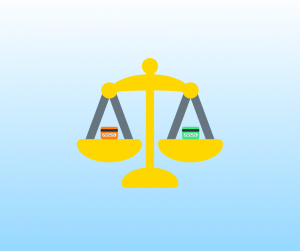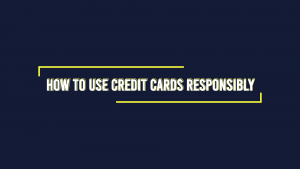A Guide to Credit Card Fees and How to Avoid Them

What Is Bad Credit and How Can It Affect You?
09/16/2023
What Are Credit Scores?
09/25/2023 Credit cards offer a convenient and safe method of spending. Instead of toting around cash or carrying a debit card that is tied directly to your bank account, a credit card gives users the ease of swiping to purchase with abundant security features in place.
Credit cards offer a convenient and safe method of spending. Instead of toting around cash or carrying a debit card that is tied directly to your bank account, a credit card gives users the ease of swiping to purchase with abundant security features in place.
While credit cards are convenient, the reality is there are sometimes plenty of fees attached. If you want to learn more about credit card fees and how to avoid them, you are in the right place.
Common Credit Card Fees
When you think about credit card costs, your mind might jump to the notoriously high interest rates. It’s true that credit cards tend to have high interest rates. For example, the Federal Reserve reported an average credit card interest rate of 20.40% in the fourth quarter of 2022.
But sky-high interest rates aren’t the only costs associated with credit cards. Most credit cards come with a slew of fees that can take a bite out of your wallet. The worst part is you might not realize these fees are involved until you are required to pay them.
The good news is understanding what fees are attached to your credit card can help you avoid credit card fees.
Annual Fee
Some credit cards come with annual fees. You may pay this fee when you are first approved for the card, and each year you continue to hold the credit card. Many credit card issuers choose to waive this fee for the first year. But on your first cardholder anniversary, you can expect to pay this fee.
The exact amount of an annual fee varies from card to card. It’s possible to find annual fees ranging from $50 to $500. Typically, rewards credit cards offering the top earning opportunities come with an annual fee.
The best way to avoid paying an annual fee is to stick with credit cards that don’t require an annual fee. You also have the option to cancel a credit card before the annual fee hits your account. In some cases, it’s worth calling the credit card issuer because they might be willing to waive the annual fee if you continue to use the credit card.
Authorized User Fee
An authorized user is someone that you add to your credit card account. Like the primary cardholder, an authorized user has the option to make purchases using the credit account. In many cases, it’s free to add an authorized user, but some credit cards charge a fee to add an authorized user to your account.
If you want to avoid this fee, consider giving your issuer a call. In some cases, the issuer may be able to waive the fee.

Balance Transfer Fee
A balance transfer occurs when you transfer the balance you hold on one credit card to another credit card. The goal of a balance transfer is usually to move the balance to a credit card with a lower interest rate, which will come in handy if you are paying down debt.
Many credit card issuers charge a fee of 3% to 5% of the amount transferred. Before pursuing a balance transfer, find out if a balance transfer fee is required. If there is a fee involved, run the numbers to find out how much you would pay to transfer the balance. Compare that total to the amount you stand to save in interest by making the transfer.
For example, if the balance transfer fee costs $300 but you stand to save $1,000 in interest charges, then the balance transfer is financially worth it.
Cash Advance Fee
You can use your card to withdraw cash. However, most credit card issuers charge a cash advance fee for this privilege.
The amount of a cash advance fee varies. But in general, you should expect to pay 3% to 5% of the cash advance amount in fees. Once you take out a cash advance, your credit card company will start to pile on the interest right away, usually with a higher interest rate.
Before taking on a cash advance, confirm the costs to avoid an expensive surprise.
Foreign Transaction Fee
A foreign transaction fee occurs when you use your credit card to make a purchase in a foreign country. Some credit cards don’t charge a foreign transaction fee, but many do.
If you plan on using your credit card abroad, take a look at the foreign transaction fees. Hopefully, your credit card doesn’t charge this fee. If it does, you might want to avoid using this credit card while abroad. Instead, take a credit card without any foreign transaction fees attached.
Late Payment Fee
If you make a late payment, your credit card company might tack a late payment fee onto your credit card balance. The maximum amount you can be charged for a late payment varies. But if you consistently make late payments, this cost can add up quickly.
Consider setting up an automatic payment option to avoid accidentally missing payment deadlines. If you’ve already been charged the fee, consider calling the credit card issuer to ask for a refund. Many are willing to offer a refund if you usually pay your balance on time.
Returned Payment Fee
When a payment gets returned, the credit card company might charge a fee. You can avoid this uncomfortable situation by checking your bank account balance before making a payment. Also, keeping some buffer funds in your account can go a long way.
Over-the-Limit Fee
While over-the-limit fees used to be common, it’s now rare for a credit card issuer to charge this type of fee. You can avoid this fee by choosing not to opt-in to this potential fee. We have the Credit CARD Act of 2009 to thank for the almost-disappearance of this pesky fee.
Shipping Fees
When you receive a physical credit card in the mail, some credit card issuers will charge for this service. If a credit card company plans to charge a shipping fee, they’ll usually let you know. Most times, you only have to pay the fee if you ask for expedited shipping.
Billing Copy Fees
If you want a physical copy of your credit card statement, some credit card issuers will charge a fee for this service. In most cases, you can access your credit card statement for free online. Since you have the option to print your documents yourself, you can easily avoid this fee.
Card Design Fees
If you want to put a special design on your credit card, you might have to pay for that privilege. Many credit card companies offer customized credit card designs for a price. You can avoid design fees by sticking with a predetermined design. If you want a unique design, be prepared to pay a fee.
How to Find the Right Credit Card
With a long list of credit card fees to avoid, you might wonder how you’ll find the right credit card for your situation. If you want to find the right card for your wallet, consider the strategies below.
Determine Your Goals
When you start looking for a new credit card, you’ll quickly realize there are dozens of options out there. Finding the right credit card isn’t as simple as marching down to your current financial institution to apply for its credit card. Instead, the process starts by evaluating your goals for this credit card.
Some thoughts to consider include:
- Credit building: Do you want to build credit or do you already have excellent credit? If you are building credit, you might need to start with a secured card.
- Purchases: Will you use this card for everyday purchases or only for big expenses? If you plan to use the card for big expenses, you may need to prioritize a higher credit limit.
- Rewards: Are you interested in credit card rewards? If you want to tap into this opportunity, consider cash-back rewards and travel reward options.
- Acceptance: If you want to use your card at a wide range of merchants, you might want to stick to an issuer that most businesses accept.
When you have a list of things you want in a credit card, it will be easier to eliminate options that don’t fit the bill. For example, those pursuing travel rewards can rule out non-rewards credit cards.
Check Your Credit Score
If you aren’t sure where your credit score stands, take a minute to check it out before applying for any new credit cards. A quick check will let you know where you stand. Once you know what your credit score is, you can avoid applying for credit cards that don’t match up.
For example, let’s say you have a poor credit score. With that information in hand, you can apply for credit cards designed for people with poor credit. You won’t accidentally hurt your credit score by applying for credit cards that only accept borrowers with excellent credit scores.
Here’s a breakdown of credit score ranges to help you see where you stand:
- Poor: A FICO credit score of 300 to 579 is considered poor.
- Fair: A FICO credit score of 580 to 669 is considered fair.
- Good: A FICO credit score of 670 to 739 is considered good.
- Very good: A FICO credit score of 740 to 799 is considered very good.
- Excellent: A FICO credit score of 800 to 850 is considered excellent.
You can check your credit score for free to see where your credit score falls.
Weigh the Fees Against the Perks
As you narrow the field of possible credit cards for your wallet, start to weigh the fees against the perks offered by the credit card. You can run this comparison by stacking the fees up and looking at the rewards offered by the credit card company.
Here are two examples to consider:
- Annual fee: Let’s say a credit card has an annual fee of $500. At first glance, this looks steep. But when you dig into the details, you realize the credit card comes with a $400 travel credit, a $100 airport voucher, and the opportunity to earn more rewards. If you will use those rewards and avoid credit card debt, this credit card might be worth the annual fee.
- Foreign transaction fee: Let’s say a credit card doesn’t come with an annual fee but it does have a 3% foreign transaction fee. If you plan on traveling extensively with this credit card, the 3% transaction fee may add up quickly.
Take the time to consider the fees and rewards against any credit card you seriously consider. You might be surprised to find some credit cards with high annual fees can actually be a good deal. But you’ll need to run the numbers to ensure the card makes sense for your unique financial situation.
Apply for the Right Credit Card
After doing your research, it’s time to apply for your new credit card. If possible, avoid applying to more than one credit card at a time. Applying for too much new credit at once can have a negative impact on your credit score. With that, it’s best to stick to one new credit card at a time.
In many cases, you’ll hear back from the credit card issuer right away. If you are approved, it often takes several days to receive your physical credit card in the mail. But some credit card issuers give you instant access to a virtual version of the card to start making online purchases right away.
Spend Responsibly
Once you have the credit card in your hands, it’s important to stick to responsible spending habits. Of course, it’s entirely possible to have a higher credit card limit than you can reasonably afford to spend. Avoid the temptation to overspend. Instead, only spend what you can afford to pay off each month.
As you use your credit card, maintaining responsible spending patterns will help you stay away from many unwelcome credit card fees.
FAQ
How Can I Avoid Credit Card Fees?
The first step to avoiding credit card fees is to read your cardholder agreement. When you understand what credit card fees you might encounter, you can take action to avoid these fees.
Why Are My Credit Card Fees So High?
The cost of credit card fees varies based on your issuer. In some cases, you’ll find high fees tied to your credit card. In other cases, the issuer will offer a relatively low fee structure. Regardless of the credit card you have, you should take the time to get familiar with the credit card fees tied to your account.
How Do I Get Rid of an Annual Fee on My Credit Card?
If your credit card comes with an annual fee, you likely cannot get rid of it. But it’s worth calling your credit card issuer. In some cases, the issuer will waive your annual fee. You might be more likely to have the fee waived if you used your credit card responsibly throughout the year.
Why Would You Get a Credit Card With an Annual Fee?
Most credit cards that come with an annual fee also come with cardholder perks. If you are going to carry a credit card, you might want to make the most of your spending by enjoying these perks. For some, the cost of the annual fee is outweighed by the credit card’s rewards.
The Bottom Line
Credit card companies have a reputation for squeezing funds out of their customers. If you are carrying a credit card, it likely comes with strings attached. Beyond the relatively high interest rates, you need to watch out for the fees attached to credit cards.
As you move forward with using your credit card, paying attention to the details can help you avoid any painful credit card fees.




